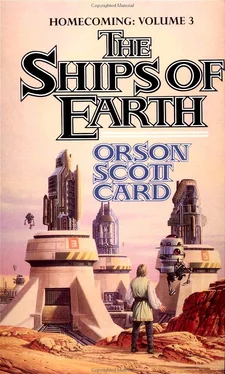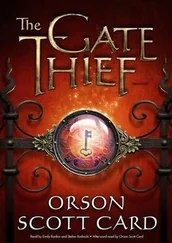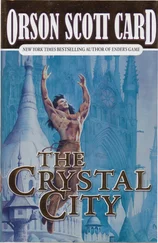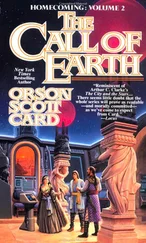Orson Card - THE SHIPS OF EARTH
Здесь есть возможность читать онлайн «Orson Card - THE SHIPS OF EARTH» весь текст электронной книги совершенно бесплатно (целиком полную версию без сокращений). В некоторых случаях можно слушать аудио, скачать через торрент в формате fb2 и присутствует краткое содержание. Жанр: Фантастика и фэнтези, на английском языке. Описание произведения, (предисловие) а так же отзывы посетителей доступны на портале библиотеки ЛибКат.
- Название:THE SHIPS OF EARTH
- Автор:
- Жанр:
- Год:неизвестен
- ISBN:нет данных
- Рейтинг книги:4 / 5. Голосов: 1
-
Избранное:Добавить в избранное
- Отзывы:
-
Ваша оценка:
- 80
- 1
- 2
- 3
- 4
- 5
THE SHIPS OF EARTH: краткое содержание, описание и аннотация
Предлагаем к чтению аннотацию, описание, краткое содержание или предисловие (зависит от того, что написал сам автор книги «THE SHIPS OF EARTH»). Если вы не нашли необходимую информацию о книге — напишите в комментариях, мы постараемся отыскать её.
THE SHIPS OF EARTH — читать онлайн бесплатно полную книгу (весь текст) целиком
Ниже представлен текст книги, разбитый по страницам. Система сохранения места последней прочитанной страницы, позволяет с удобством читать онлайн бесплатно книгу «THE SHIPS OF EARTH», без необходимости каждый раз заново искать на чём Вы остановились. Поставьте закладку, и сможете в любой момент перейти на страницу, на которой закончили чтение.
Интервал:
Закладка:
"You're trembling, Lutya," said Hushidh.
"Am I?" Perhaps that was why she was having so much trouble making certain of the cinch on her camel's saddle.
"Like a dragonfly's wing."
"It was a very emotional thing," said Luet. "I suppose that I'm still upset."
"Still jealous of Eiadh, that's what you are," said Hushidh.
"Not even a speck," said Luet. "He loves me absolutely and completely."
"Yes, he does," said Hushidh. "But still I see such rage in you toward Eiadh."
Luet knew that she did, yes, feel some jealousy toward Eiadh. But Hushidh had called it rage, and that was a far stronger feeling than she had been aware of in herself. "I'm not angry because she loves Nafai," said Luet, "truly I'm not."
"Oh, I know that," said Hushidh. "Or rather, I see that now. No, I think you're angry at her and jealous of her because she was able to save your husband's life, when you couldn't do it."
Yes, thought Luet. That was it. And now that Hushidh had named it, she could feel the agonizing frustration of it wash through her, and hot tears of rage and shame flooded out of her eyes and down her cheeks. "There," said Hushidh, holding her. "It's good to let it out. It's good."
"That's nice," said Luet. "Because apparently I'm going to cry like a ninny whether it's good to let it out or not, so it might as well be good."
She was still crying when Nafai came back to find her and help her on her beast. "You're the last one," said Nafai.
"I think I just needed to feel you touch me one more time," she said. "To be sure you were alive."
"Still breathing," he said. "Are you going to cry like that for long? Because all that moisture on your face is bound to attract flies."
"Whatever happened to those bandits?" she said, wiping her tears with her sleeve.
"The Oversoul managed to put them to sleep just before it started getting serious about influencing the others. They'll wake up in a couple of hours. Why did you think about them?"
"I was just thinking how stupid we would all have felt, if they had come running up and hacked us all to pieces while we stood there bickering about whether or not to kill you."
"Yes," said Nafai. "I know what you mean. To face death, that's nothing much. But to feel really stupid when you die, well, that would be insufferable."
She laughed and held his hand for just a moment. Just another moment, and then another long, long moment.
"They're waiting for us," said Nafai. "And the bandits will wake up eventually."
So she let go of him, and as soon as he headed toward his own camel, hers lurched to its feet and she rose high above the desert floor. It was like riding atop an unsteady tower in an earthquake, and she didn't usually like it. But today it felt as lovely as she had ever imagined it might be to sit upon a throne. For there, on the camel before her, sat Nafai, her husband. Even if it had not been Luet herself who saved him, what of it? It was enough that he was alive, and he was still in love with her.
THREE—HUNTING
They came down into Volemak's camp in the evening. They had traveled longer than usual that day, because they were close; yet still there was all the evening work to do, for Volemak had not known they were coming that night, and there were no extra tents pitched, and Zdorab had already washed up from the supper he prepared for himself and Volemak and Issib. The evening work went slower than usual, because they felt safer, and because, having arrived, it seemed so unfair to have as much work to do as during the journey.
Hushidh stayed as close to Luet and Nafai as she could. She caught glimpses of Issib now and then as he floated somewhere on his chair. There was nothing surprising to her about his appearance—she had known him for years, since he was Lady Rasa's oldest son and had studied at Rasa's house as long as Hushidh had been there herself. But she had always thought of him as the crippled one, and paid him little mind. Then, back in Basilica, as she came to realize that she was going out onto the desert with Nafai and Luet, it came clear to her—for she could always see the connections between people—that in the pairings of male and female in the Oversoul's expedition, she would end up with Issib. The Oversoul wanted his genes to go on, and hers as well, and for good or ill they would be making that effort together.
It had been a hard thing to accept. Especially on the wedding night, as Luet and Nafai, Elemak and Eiadh, Mebbekew and Dolya all were married by Lady Rasa and then went, two by two, to their bridal beds, Hushidh could hardly bear the rage and fear and bitter disappointment in her heart, that she could not have the kind of love that her sister Luet had.
In answer, the Oversoul—or so she had thought at first—sent her a dream that night. In it she saw herself linked with Issib; she saw him flying and flew with him; she understood from that that his body did not express his true nature, and that she would find that marriage with him was not something that would grind her down but rather would lift her up. And she saw herself bearing children with him, saw herself standing in the door of a desert tent with him, watching their children play, and she saw that in that future scene she would love him, would be bound with him by gold and silver threads tying them back through generations, and leading them also forward into the future, year by year, child by child, generation by generation. There were other parts of the dream, some of them terrifying, but she clung to the comfort of it all these days. As she had stood with General Moozh, forced to marry the conqueror of Basilica, she had thought about the dream and knew that she would not really end up with him, and sure enough, the Oversoul brought Hushidh's and Luet's mother, the woman named Thirsty, who named them as her daughters—with Moozh as their father. No marriage then, and within hours they were in the desert, on their way to join Volemak in the desert.
But since then she had had time to think—time to remember her fears. Of course she tried not to, tried instead to cling to the comfort of the dream, or to Nafai's reassurances, for he had told her that Issib was very bright and funny, a man of good company, which of course she had never had much chance to see at school.
Yet despite the dream, despite Nafai, her old impressions, the ones she had held for so many years, remained. All the way through the desert she kept seeing the almost macabre way his arms and legs used to move in the city, where he could wear lifts under his clothing, so that he always seemed to be bouncing through the air like gamboling ghost, or like a—what was it that Kokor had once called him?—like a rabbit under water. How they had laughed! And now, how disloyal she felt, although it had been Issib's own sister who made the joke. Hushidh could not have guessed that someday the cripple, the ghost, the underwater rabbit would be her husband. The old fear and strangeness remained as an undercurrent, despite all her attempts to reassure herself.
Until now, seeing him, she realized that she was not afraid of him. The dream had given her too much hope. No, she was afraid of what he would think of her— an even older and darker fear. Did Issib know yet what Aunt Rasa and the Oversoul had planned for him? Was he already eyeing her as she worked at tent-pitching, sizing her up? No doubt that if he was, he would be bitterly disappointed. She could imagine him thinking, Of course the cripple gets the plain one, the one too tall, the sour-faced one whose body has never caused a man to take a second glance. The studious one, who has no gift for causing anyone to laugh, except sometimes her younger sister Luet (ah, so bright! but she belongs to Nafai). He must be thinking: I'll have to make the best of it, because I'm a cripple and have no choice. Just as I'm thinking, I'll have to make do with the cripple, because no other man would have me.
Читать дальшеИнтервал:
Закладка:
Похожие книги на «THE SHIPS OF EARTH»
Представляем Вашему вниманию похожие книги на «THE SHIPS OF EARTH» списком для выбора. Мы отобрали схожую по названию и смыслу литературу в надежде предоставить читателям больше вариантов отыскать новые, интересные, ещё непрочитанные произведения.
Обсуждение, отзывы о книге «THE SHIPS OF EARTH» и просто собственные мнения читателей. Оставьте ваши комментарии, напишите, что Вы думаете о произведении, его смысле или главных героях. Укажите что конкретно понравилось, а что нет, и почему Вы так считаете.









